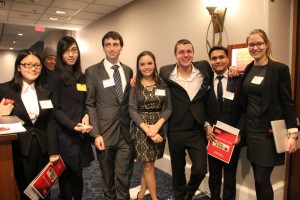Tension and resolution overlap in the Historical General Assembly

Delegates representing the Republic of Congo, Venezuela, Mauritius and Sierra Leone in the Historical General Assembly, 2000
By YENA SEO, THE WASHINGTON POST
With the dawning of a new millennium, member states of the United Nations gathered at the Harvard National Model United Nations conference to discuss new Millennial Development Goals (MDG) and their impact on resources around the world. While most of the countries were in agreement on the importance of the MDGs in the Historical General Assembly, tensions were high in committee as various blocs began to form.
India, working with delegates representing South Korea and Bangladesh, noted that there were eight different blocs in the committee, despite multiple similarities and crossover in their resolutions. India, whose bloc represents countries of various economic backgrounds, stressed that the MDGs should focus on the basics that people need, such as food, water, education and healthcare.
“The Millennium Development Goals give us a plan for the future after a century of hard trials and tribulations,” the delegate of India said. “However, many of the working papers being discussed are the same in terms of context, and certain countries are being rather forceful in their negotiations.”
Other countries seemed to be working cohesively with their respective blocs. The Republic of Congo, working with Venezuela and Mauritius, hoped to unite low-income countries to create a more comprehensive plan, rather than taking a “one-size-fits-all” approach.
“We want to gather our efforts and make a solution that is adaptable for many countries,” the delegate of the Republic of Congo said. “We are focusing on extreme poverty, alimentation, education, healthcare and environmental sustainability, and making sure there are specifics for each of those categories.
Because of the overlap between many of the papers, certain blocs have been attempting to distance themselves through more detailed measures. Sweden hoped to focus more on campaigns, with a focus on short-term and long-term goals.
“We want to offer guiding principles,” the delegate representing Sweden said. “Water could be the next big thing, and we need to take action now.”



Recent Comments